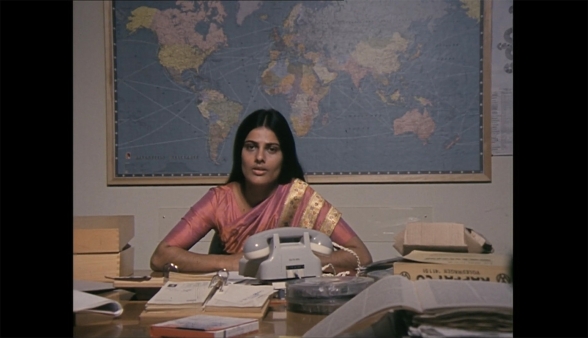Workspace - Unterrichtsmaterialien
Thematic Archive Walk
Decolonisation
Pfade und Programme
The Fifth Wall - Thematic walk through the archive on:
DECOLONISATION
Developed by Dr. Rubaica Jaliwala
The digital archive, The Fifth Wall, is a treasure trove of material comprising films, reportages, texts, letters, photos, which is a tremendous resource to discuss themes of interculturality and diversity, gender, racism and migration and to explore strategies to transform hierarchies.
This thematic walk on DECOLONISATION is just one example of how the archive can be used for educational purposes. Accordingly, the sessions, process and flow of the thematic walk can be adapted to different settings, contexts and target groups. The programme below can be made interdisciplinary by presenting the archival material within a theoretical framework and using an interactive training methodology.
I. Introduction
1. Trainer introduction
2. Explain the flow and process of the session
3. Brief introduction to the theme
II. Decolonisation: examples of India, Guinea-Bissau & Western Sahara
1. Film excerpt: SO LONG AS THERE ARE TEARS, 1972: 00:00 - 01:23 (1:23 mins)
Sundaram directed this film on the 25th anniversary of India’s independence. Using archival footage, the film analyses Indian history since independence and questions the progress made over the past 25 years.
Discussion questions:
-What was the mood like at the time of independence? What were the hopes and aspirations?
-What was the actual result, the situation 25 years later?
2. Commentary: POSTCOLONIAL UTOPIAS, 2018 (1:51 mins)
Discussion questions:
-What was the awareness of the newly awakened? What emerged as a result? Was it positive in the long run?
3. Film: THE LEGACY OF AMÍLCAR CABRAL, 1976 (7:43 mins)
Through this reportage on the repatriation of Amílcar Cabral from Guinea, Sundaram emphasises the impact of the 10-year liberation struggle of Guinea-Bissau far beyond its its own borders.
Discussion questions:
-In what state did the Portuguese leave Guinea-Bissau?
-How is the party in power working to develop the country?
-To what extent do you think the country succeeded in developing itself?
4. Film: HOTSPOT WESTERN SAHARA, 1976 (9:48 mins)
This reportage presents a first-hand moment of decolonisation in the former Spanish-Sahara. As Spanish soldiers depart Western Sahara, Mauritanian and Moroccan armies are arriving in the country and the Polisario Front is fighting for their rights with Algerian support.
Discussion questions
-Why has a new hotspot emerged?
-What are the motives for Morocco, Mauritania and Algeria in “helping” Western Sahara?
5. Commentary: THE WORLD WAS DIVIDED UP AMONG THE BROADCASTERS, 2018 (1:44 mins)
Discussion questions:
-What is decolonisation?
-What is required for successful decolonisation?
III. Decolonising the mind
In Becoming Indian (2010), the author Pavan K. Varma argues that the end of colonialism does not signal the end of its consequences because colonialism was not just about the physical oppression of people, its real strength lay in the colonisation of minds.
1. Film: EPILOGUE TO THE FILM “THE DRUM”, 1980 (5:24 mins)
“The Drum” by Zoltan Korda was shown in the broadcast series “Film Club”. In her epilogue to the film, Sundaram encourages audiences to view the film as a historical work of entertainment and not as a confirmation of prejudices against people of the Global South.
Discussion questions:
-Why did we continue with British traditions even after they left?
-What did the colonisers leave behind in their colonies?
-What else has been forever imprinted?
2. Commentary: I AM A NEHRU CHILD, 2004 (2:34 mins)
Discussion questions:
-Sundaram’s dramaturgical approach was one she had to fight for. What do you think this was so? (e.g. she didn’t want to present a postcolonial western view of India, she wore a sari - a provocative gesture)
-Why would western audiences want an restricted, essentialised view of India?
3. Commentary: BACKGROUND BRAITHWAITE INTERVIEW, 2018 (3:06 mins)
Discussion questions:
-What purpose does the title of “honorary white” serve?
-Why is there chaos when he goes out spontaneously?
4. Film: INTERVIEW EDWARD BRAITHWAITE, 1976 (8:25 mins)
In this landmark interview, Sundaram speaks to the Guyanese-born writer and diplomat Edward Braithwaite, who had published a travelogue on his visit to South Africa entitled “Honorary White”.
Discussion questions:
-What are the justifications white South Africans used not to include black people in the government? Why did they offer the homelands to black South Africans?
-Why are people so “simple-minded” as the white South Africans were to Braithwaite?
-What do you think about what Braithwaite said: that Afrikaners don’t have to stay in South Africa?
Why is it important for the Afrikaners to change their mindset? What is he trying to make them/us aware of?
Additional discussion questions:
-How do you recognise the internalisation of dominance and of oppression? (e.g. dominance: subtle racism, essentialised views; oppression: feeling and acting inferior)
-What is required to decolonise the mind - both on the part of former colonisers and on the part of the former colonised?
In 1970, Paulo Freire, Brazilian educator and leading advocate of critical pedagogy, emphasized: The oppressed, having internalised the image of the oppressor and adopted his guidelines, are fearful of freedom. Freedom would require them to eject this image and replace it with autonomy and responsibility.
5. End with commentary: I TOOK A STAND, 2018 (2:02)